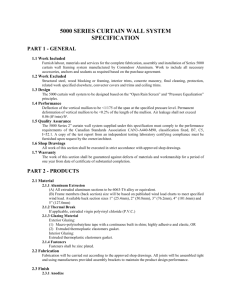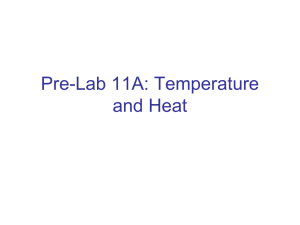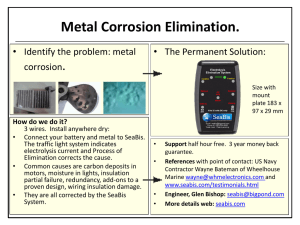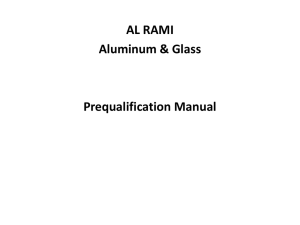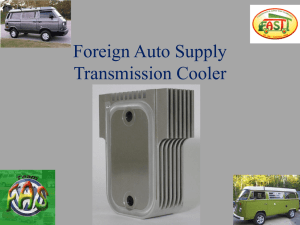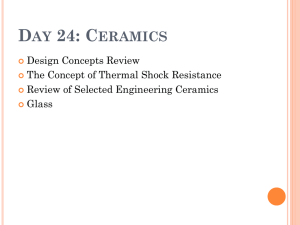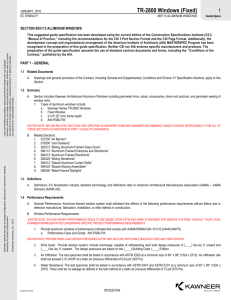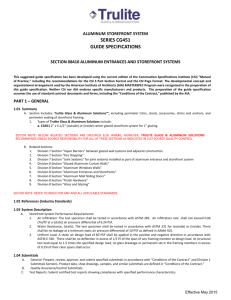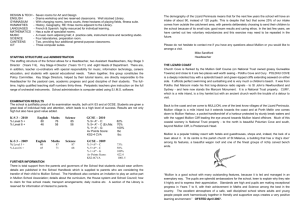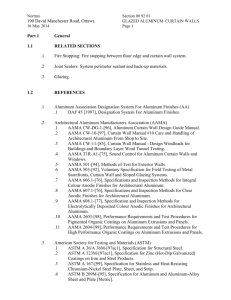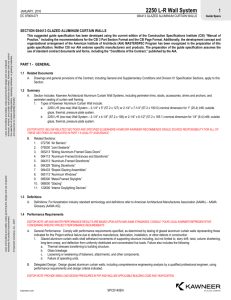Sloped Glazing
advertisement
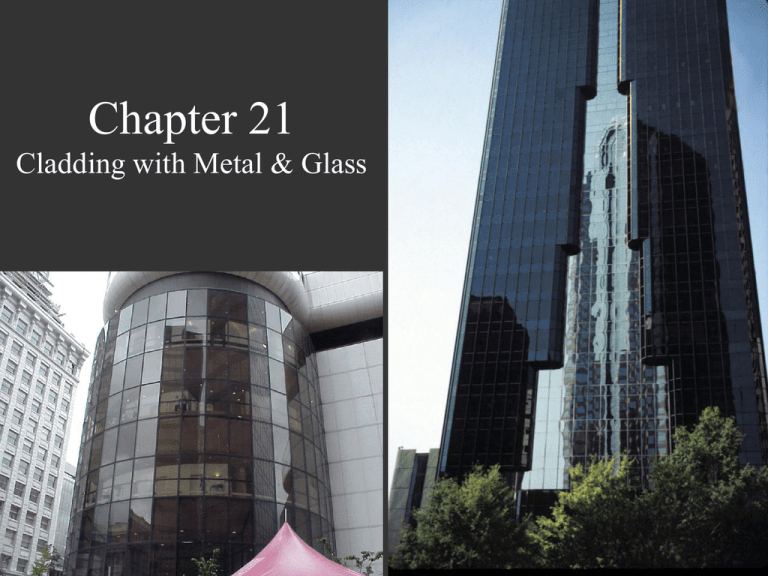
Chapter 21 Cladding with Metal & Glass Metal & Glass Curtain Walls Connected to , but isolated from, the building frame Support only their weight & resist lateral forces Insulated & thermally broken Maximize comfort, minimize H/C costs & condensation Incorporate advanced glazing & spandrel materials (luminous & thermal properties) Gaskets & drainage to prevent water infiltration Architectural appearance & ease of installation Internal features, fasteners, etc. … concealed Multiple extrusion shapes, finishes, & colors Metal Frames - Extrusions Aluminum - the metal of choice Doesn’t corrode (beyond a thin oxidized layer) Can accept, and hold, a variety of finishes Economically fabricated - extruded (multiple shapes) Extrusion Heated metal is forced through a die Continuous ribbon of material Highly precise cross-section Multiple shapes available Die Extrusion Thermal Breaks Aluminum - not a good insulator Cold climates - inside metal cold Interior condensation (even frost) Hot climates - metal cooled by AC Exterior condensation System Needs - Thermal Break Thermal Break Definition “internal components of insulating material that isolate the aluminum on the interior side of the component (mullion) from aluminum on the exterior face” Construction (rubber or plastics) Thermal Break Thermal Breaks Aluminum Finishes Natural oxidized finish - not attractive Applied Coatings Annodized coatings Organic coatings Multi-coat sprayed Powder Coatings sprayed powder - baked Polyvinyl chloride (PVC) Mechanical Finishes brush, sandblast, polish, etc. Annodized Coatings Oxidized coating produced in an acid bath Additives can produce a number of colors Most common - bronzes Advantages: Extremely hard coating Very good resistance to weather & fading Disadvantage: color consistency Sampling of Mullion Colors Aluminum & Glass L.C. Assembly Components Mullions Shear Blocks Screws Gaskets “Snap-ons” Modes of Curtain Wall Assembly Stick Systems Unit System Panel Systems Column Cover & Spandrel System Stick Systems Components •Vertical Mullions • Horizontal Mullions •Glass Panels •Spandrel Panels Assembly •In the “Field” Advantages •Minimal shipping bulk •Latitude for field adj. •“Hand” set components •Economical Disadvantages •Built on “site”•Quality Control ‘Stick’ Systems Unit Systems Components •Pre-assembled Framed Unit Assembly •Factory Assembly •Field unit installation Advantages •Minimizes on-site labor •Factory - “controlled” Disadvantages •Larger shipping bulk •Site protection of mat’l •Heavier wgt. - cranes? Panel Systems Components •Homogenous units •Formed from sheet metal Assembly •Fabrication - shop •Field installed Advantages •Minimizes on-site labor •Factory - “controlled” Disadvantages •$ of custom molds •Larger shipping bulk •Site protection of mat’l •Heavier wgt. - cranes? Column Cover & Spandrel “emphasizes the structural module of the building” Components •Column Covers •Spandrel panels •Glazing units Assembly •Field installation Disadvantages •Field Assembly •$ for custom design (no “standard” blg. module) Column Cover & Spandrel Types of Glazing Outside Glazed “Glass installed (or replaced) from the outside” Simple mullion system Typically more economical on low-rise blgs. Inside Glazed “Glass installed (or replaced) from the inside” More elaborate mullion components/system Higher material costs Typically more convenient & economical on tall buildings Lower field labor costs Snap Cover Outside glazed “stick” system Shear Block Thermal Break Pressure Plate Stick system “externally” glazed Thermal Break Interior Gaskets Pressure Plate One Piece Extrusion Two Piece Extrusion Building Anchorage Mullion “Splicing” Inside Glazed Inside Glazed continued Bottom Half of the Horizontal Mullion Installed after Glass Installation Expansion Joints Metal and Glass Aluminum High coefficient of thermal expansion Twice the coefficient of Glass Aluminum to Glass expansion / contraction Gaskets Blocks (spacers) keep glass form Walking w/i opening Aluminum mullion Expansion / Contraction Telescoping joints in vertical mullions Horizontal mullions cut slightly short Sloped Glazing - Skylight Sloped Glazing - Skylight Unique Problems w/ Sloped Glazing •Gravity “pulling” H2O thru the “System” •Internal Condensation •Both can cause •discomfort - occupants •damage Solution • “Internal Drainage System Sloped Glazing - Skylight Cladding In Metal Sheets of Copper Stainless Steel SS Jointing Painted Metal Panels Metal Panels Aluminum Panels Aluminum Panel Column Covers Aluminum Panel Column Covers Aluminum Panels Experience Music Project ‘Rock n Roll Museum’ Seattle (6 photos) Stainless Steel, Copper, and Coated Metal Panels Curtain Wall Design Complex & Specialized Process (often a proprietary system adopted that meets design criteria) Design ‘specialists’ consulted Concept drawings prepared by A&E Detailed design documents prepared by manufacturer – followed by shop dwgs. A/E reviews to ensure design compliance Full-scale testing Manufacturer and then erection Sustainability in Aluminum Cladding Raw material plentiful, but refining requires considerable energy (embodied energy 6x steel) Large quantities of water required for smelting & waste water contains pollutants Aluminum recycled at a very high rate Extrusions easy to produce and light weight Powder coating release no solvents into the atmosphere Low maintenance, but highly conductive (thermal breaks required)
